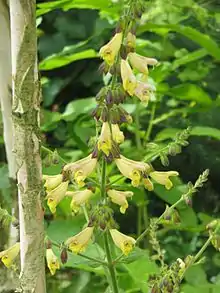Salvia omeiana
Salvia omeiana is a perennial plant that is native to forest edges and hillsides in Sichuan province in China, growing at 1,400 to 3,100 m (4,600 to 10,200 ft) elevation. It is a robust erect-growing plant reaching .4 to 1 m (1.3 to 3.3 ft), with broad cordate-ovate to hastate-ovate leaves that are 10 to 16 cm (3.9 to 6.3 in) long and 6.5 to 14.5 cm (2.6 to 5.7 in) wide. Inflorescences are raceme-panicles, with a 2.5 to 3.5 cm (0.98 to 1.38 in) yellow corolla.
| Salvia omeiana | |
|---|---|
 | |
| Scientific classification | |
| Kingdom: | Plantae |
| Clade: | Tracheophytes |
| Clade: | Angiosperms |
| Clade: | Eudicots |
| Clade: | Asterids |
| Order: | Lamiales |
| Family: | Lamiaceae |
| Genus: | Salvia |
| Species: | S. omeiana |
| Binomial name | |
| Salvia omeiana E. Peter | |
| Varieties | |
| |
There are two varieties: Salvia omeiana var. omeiana has an ovate shaped bract, and no hairs inside the corolla tube. Salvia omeiana var. grandibracteata has a more lanceolate bract, and is slightly hairy inside the corolla tube.[1]
References
- "Lamiaceae" (PDF). Flora of China. Harvard University. 17: 155–156. 1994. Archived from the original (PDF) on 2011-09-29.
This article is issued from Wikipedia. The text is licensed under Creative Commons - Attribution - Sharealike. Additional terms may apply for the media files.